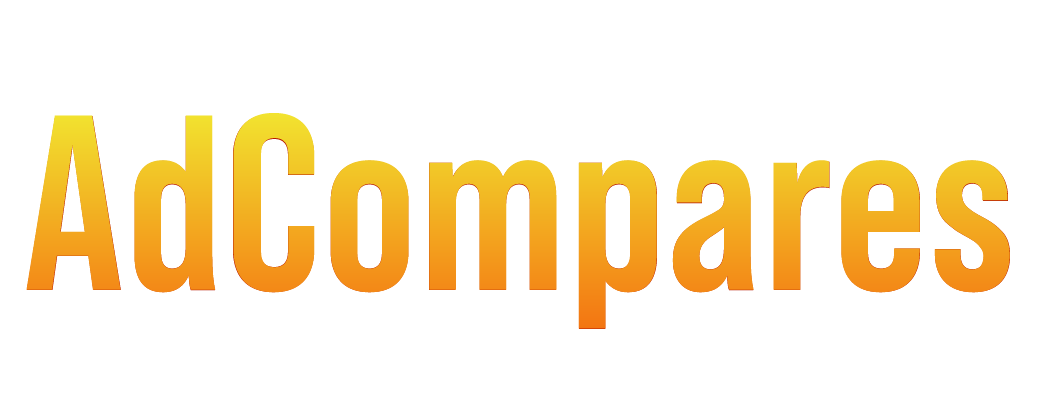In 2026, Affiliate marketing is more competitive than ever, and success depends on more than just driving traffic; it’s about precise tracking of every click, conversion, and commission. Without reliable affiliate tracking software, affiliates, advertisers, and eCommerce managers risk losing revenue and struggling with complex multi-channel campaigns across TikTok, Instagram, YouTube Shorts, and email. As third-party cookies vanish and privacy-first regulations tighten, manual affiliate program management simply can’t keep up. This is where modern referral tracking software, commission management platforms, and performance marketing tools become the backbone of a profitable strategy.
With affiliate marketing spend projected to surpass $15 billion in 2026, choosing the best affiliate tracking software is no longer optional—it’s critical. The right solution gives SaaS founders, online retailers, and marketing agencies real-time partner tracking, automated payouts, and advanced affiliate attribution that fuel scalable growth. In this guide, we’ll review thetop affiliate tracking software of 2026, compare features like campaign optimization and marketing automation, and help you find the perfect tool to future-proof your affiliate marketing strategy and maximize ROI.
What is Affiliate Tracking Software?
Affiliate tracking software is a tool that records clicks, impressions, sales, signups, and payouts across affiliate campaigns. Think of it as the “control room” that ensures affiliates get credit for the traffic and sales they generate. Unlike Google Analytics or Mixpanel, which provide broad website analytics, affiliate trackers specialize in attribution, fraud prevention, and payout automation. They provide real-time reporting, ensuring that affiliates and businesses know exactly where revenue is coming from and how to optimize it.
Affiliate tracking software is a specialized tool that recordsclicks, impressions, conversions, and payouts between affiliates and businesses.
- Real-time reporting ensures marketers know which campaigns are performing.
- Payment automation makes payouts seamless.
Difference from analytics tools:
- Google Analytics/Mixpanel → Good for general site behavior.
- Affiliate trackers → Built for performance, attribution, fraud detection, and payouts.
Why is Affiliate Tracking Essential in 2026?
Affiliate tracking has become increasingly essential due to the impact of GDPR, CCPA, and Google’s Privacy Sandbox on data collection methods. As third-party cookies decline, first-party data and server-side solutions are vital. Marketers face attribution challenges across multiple platforms, while fraud poses a threat to their budgets. Proper tracking is crucial, as businesses risk losing 25–30% of affiliate revenue. In 2026, success will favor those using AI-driven attribution with effective multi-channel tracking.
The affiliate world isn’t what it used to be. Here’s why:
- Privacy-first era: GDPR, CCPA, and Google’s Privacy Sandbox are reshaping tracking.
- Death of third-party cookies: Brands must shift to first-party tracking.
- Multi-channel reality: Affiliates promote on TikTok, YouTube Shorts, Instagram, email, and PPC.
- Fraud protection: Fake clicks and bot leads can eat revenue.
- AI-powered attribution: Helps identify true customer journeys.
How Does Affiliate Tracking Software Work?
Affiliate tracking software works behind the scenes to make sure every click, signup, and sale is recorded accurately. It all starts with unique IDs assigned to affiliate links and actions. When a user clicks an affiliate link, the software captures this activity usingpostback URLs, pixel tracking, or APIs.
In the past, tracking relied heavily onthird-party cookies, but modern tools have shifted tofirst-party cookies andserver-to-server (S2S) tracking. This ensures better accuracy and privacy compliance. For example, an affiliate shares a product link. A customer clicks it. The software logs the click. If the customer makes a purchase, the sale is recorded, and the affiliate payout is automatically calculated.
The process is simple but powerful:
- Click is captured → using tracking methods.
- Conversion is recorded → sale, signup, or other action.
- Payout is logged → automatic and precise.
Key components likefirst-party cookies protect user privacy, whileS2S tracking minimizes lost or incorrect data. Whether cloud-hosted or self-hosted, these tools give businesses control over reporting, integrations, and data management—all without missing a single commission.
Key Features to Look for in Affiliate Tracking Software
Choosing the right affiliate tracking software in 2026 is not just about price—it’s about scalability, compliance, and adaptability. With stricter privacy laws, the rise of new ad platforms, and the decline of third-party cookies, you need a tool that offersaccuracy, automation, and global compatibility.
- Tracking Accuracy – Look for first-party tracking to combat cookie loss and ensure cross-device attribution. A tool that reliably tracks users across mobile, desktop, and apps is essential.
- Analytics – Real-time dashboards, cohort analysis, and customizable reports help you spot winning campaigns quickly and cut losses before they eat your budget.
- Fraud Protection – Click fraud and fake leads can drain up to 20–30% of budgets. Software with AI-driven fraud detection, IP filtering, and bot recognition is a must-have.
- Integrations – Seamless connections with Shopify, WooCommerce, HubSpot, Salesforce, or CRMs save time and reduce manual errors.
- Ease of Use – Even powerful features fall flat if the dashboard is clunky. A clean UI and automation (bulk payouts, affiliate approvals) improve efficiency.
- Affiliate Management – Helps streamline onboarding, bulk invites, and custom approval workflows for scaling your affiliate program.
- Scalability – Whether you’re running a small Shopify store or managing enterprise-level campaigns, the software should grow with you.
- Multi-currency & Language Support – Global affiliates demand flexibility in payments, languages, and currencies.
- Transparent Pricing – No hidden fees. The best platforms offer tiered pricing, pay-as-you-grow models, or free trials to test before committing.
Best Affiliate Tracking Software in 2026(Top Picks)
Here is a list of the best affiliate tracking software you can use to boost your program, optimize performance, and never miss a payout again.
- Voluum
- Everflow
- Partner Stack
- Post Affiliate Pro
- Tapfiliate
- Refersion
- Red Track
1. Voluum
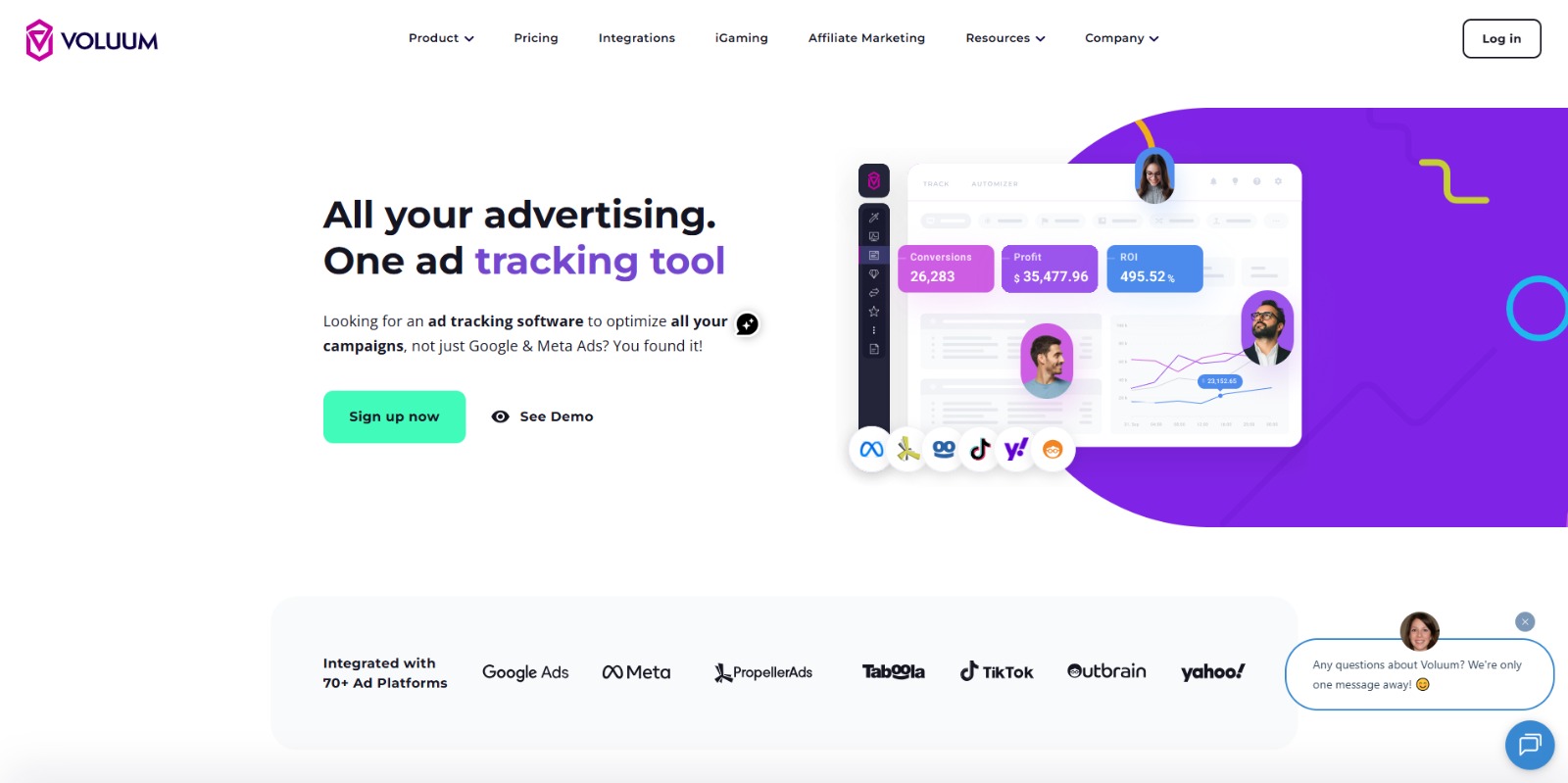
Voluum is a cloud-hosted affiliate tracking platform built for media buyers and agencies. Its AI-powered traffic distribution automatically allocates budget to high-performing sources, while its mobile-first tracking ensures accurate reporting for both app and web campaigns. Voluum provides real-time dashboards, cohort analysis, and detailed ROI metrics, allowing affiliates and advertisers to optimize campaigns efficiently.
Pros:
- AI-driven traffic routing increases campaign efficiency.
- Real-time analytics with cohort insights.
- Mobile-first tracking ensures accurate reporting for app campaigns.
- Integrates with multiple ad networks and marketing platforms.
- Customizable dashboards for personalized reporting.
- Supports multi-currency and multi-device tracking.
- Automated alerts for anomalies in campaigns.
Cons:
- Higher cost compared to beginner-friendly tools.
- Advanced features require learning time.
- Relies on stable cloud access for optimal performance.
- It may be too complex for small-scale affiliates.
- Some integrations require technical setup.
Best For: Media buyers, ad networks, and agencies running paid ads at scale.
2. Everflow
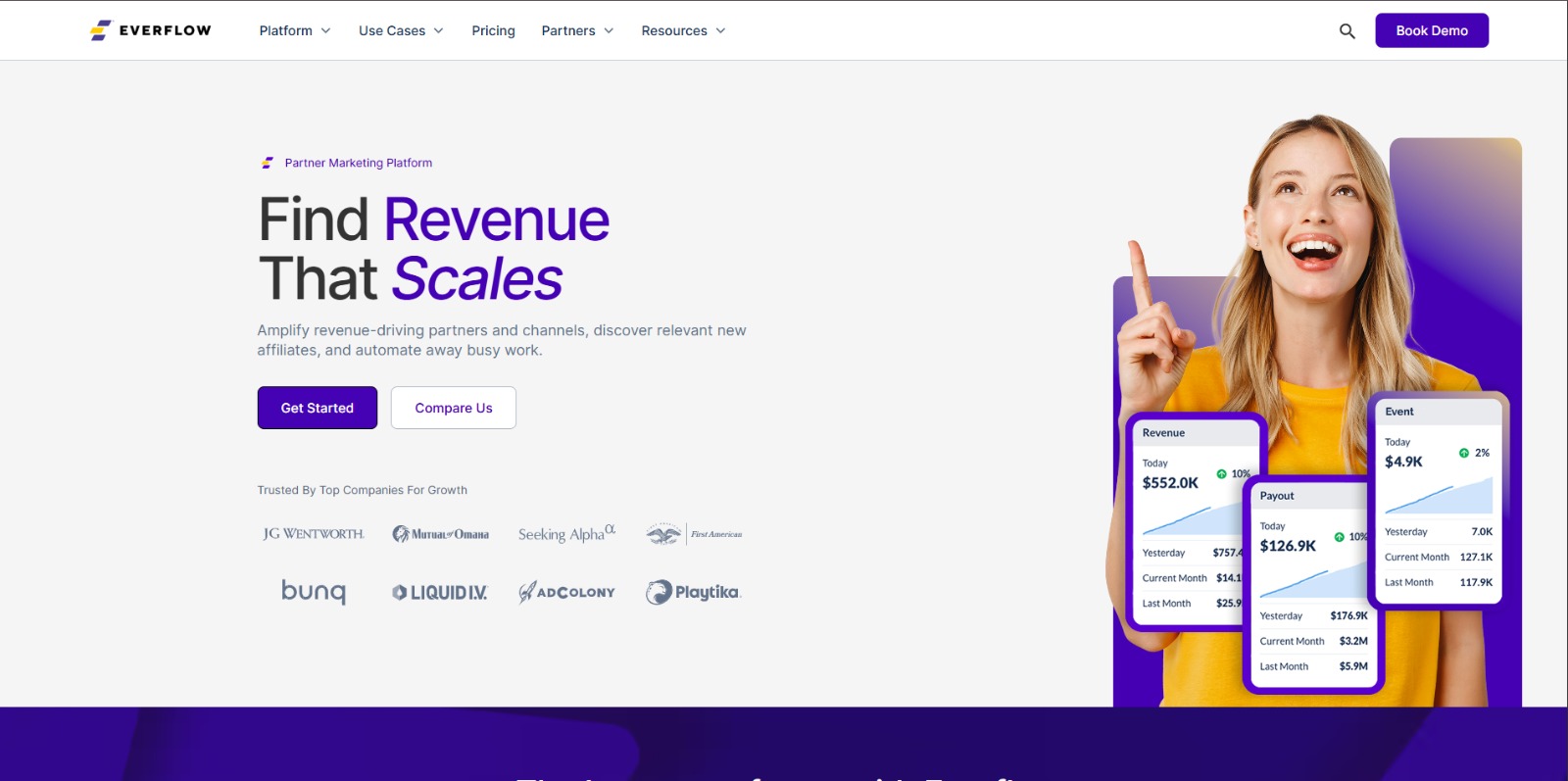
Everflow is designed for enterprise-grade campaigns and large agencies. Its smart links, customizable dashboards, and automated workflows simplify managing multiple affiliates. It supports multi-currency, cross-device tracking, and provides advanced reports to monitor clicks, conversions, and ROI in detail.
Pros:
- Advanced analytics with detailed filters.
- Automation saves time on affiliate approvals and payouts.
- Ideal for managing multiple campaigns across regions.
- Supports smart links for easy tracking.
- Multi-currency and multi-language support.
- Customizable dashboards for better visualization.
- Real-time reporting ensures timely decision-making.
Cons:
- Too complex for smaller businesses.
- Higher price for full enterprise features.
- It can be overwhelming for beginners.
- Some features require additional setup.
- Limited support on lower-tier plans.
Best For: Large businesses, agencies, and enterprises managing multiple partners.
3. PartnerStack
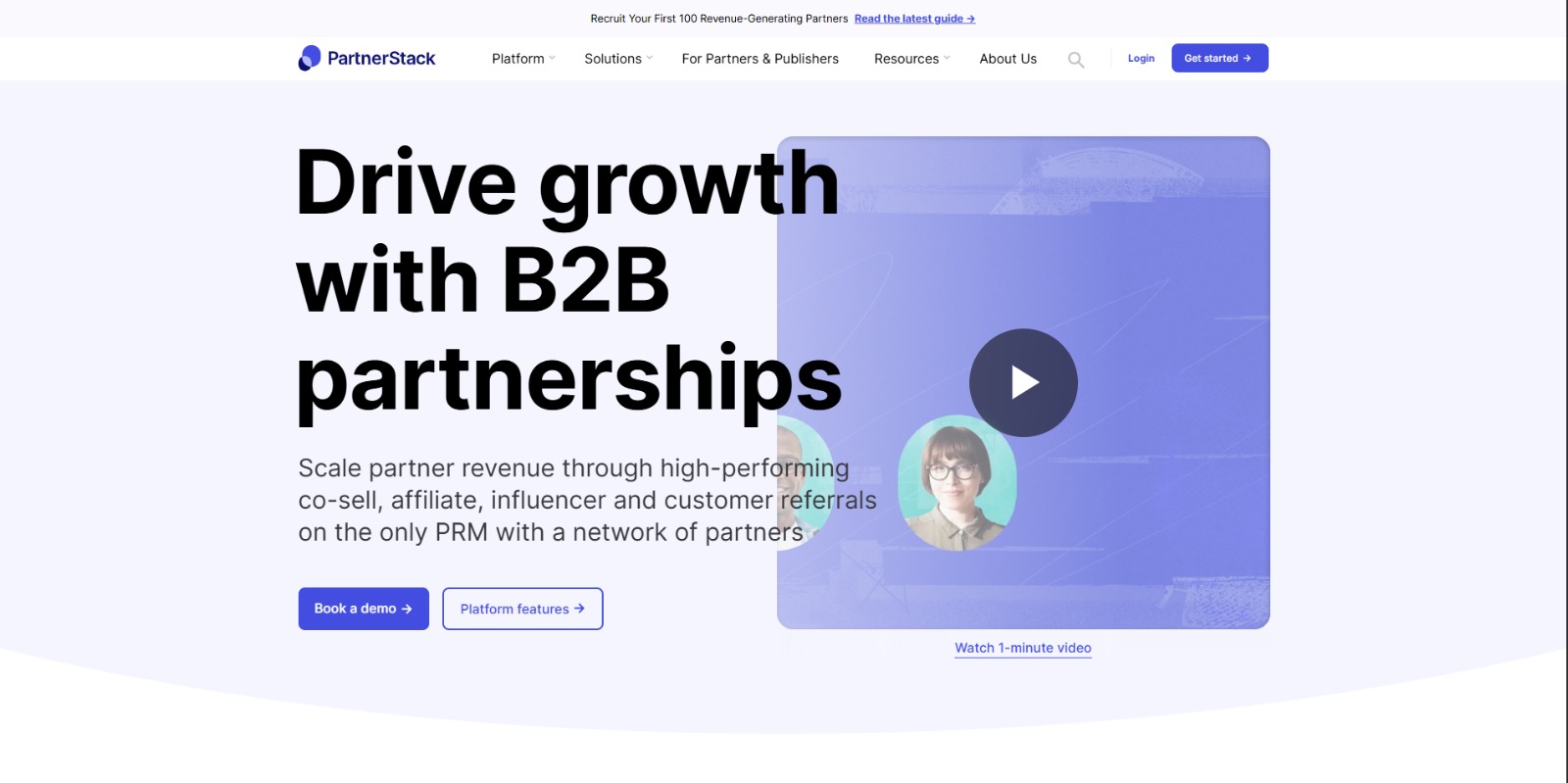
PartnerStack is a B2B SaaS-focused affiliate platform that integrates deeply with CRM systems and automates payouts. It helps SaaS companies manage partner programs, track leads, and measure campaign performance. Its automated workflows reduce manual errors and improve affiliate engagement.
Pros:
- Seamless CRM and SaaS platform integration.
- Automated payout and reporting system.
- Ideal for scaling B2B affiliate programs.
- Easy to manage partner onboarding.
- Supports recurring commissions for SaaS subscriptions.
- Built-in performance analytics for partners.
- Reduces manual errors with automated workflows.
Cons:
- Limited options for non-SaaS industries.
- May require onboarding time for teams new to the affiliate software.
- Cost can be high for smaller startups.
- Reporting is less granular than enterprise trackers.
- Lacks some advanced ad-tracking capabilities.
Best For: SaaS companies looking to grow through partnerships.
4. Post Affiliate Pro
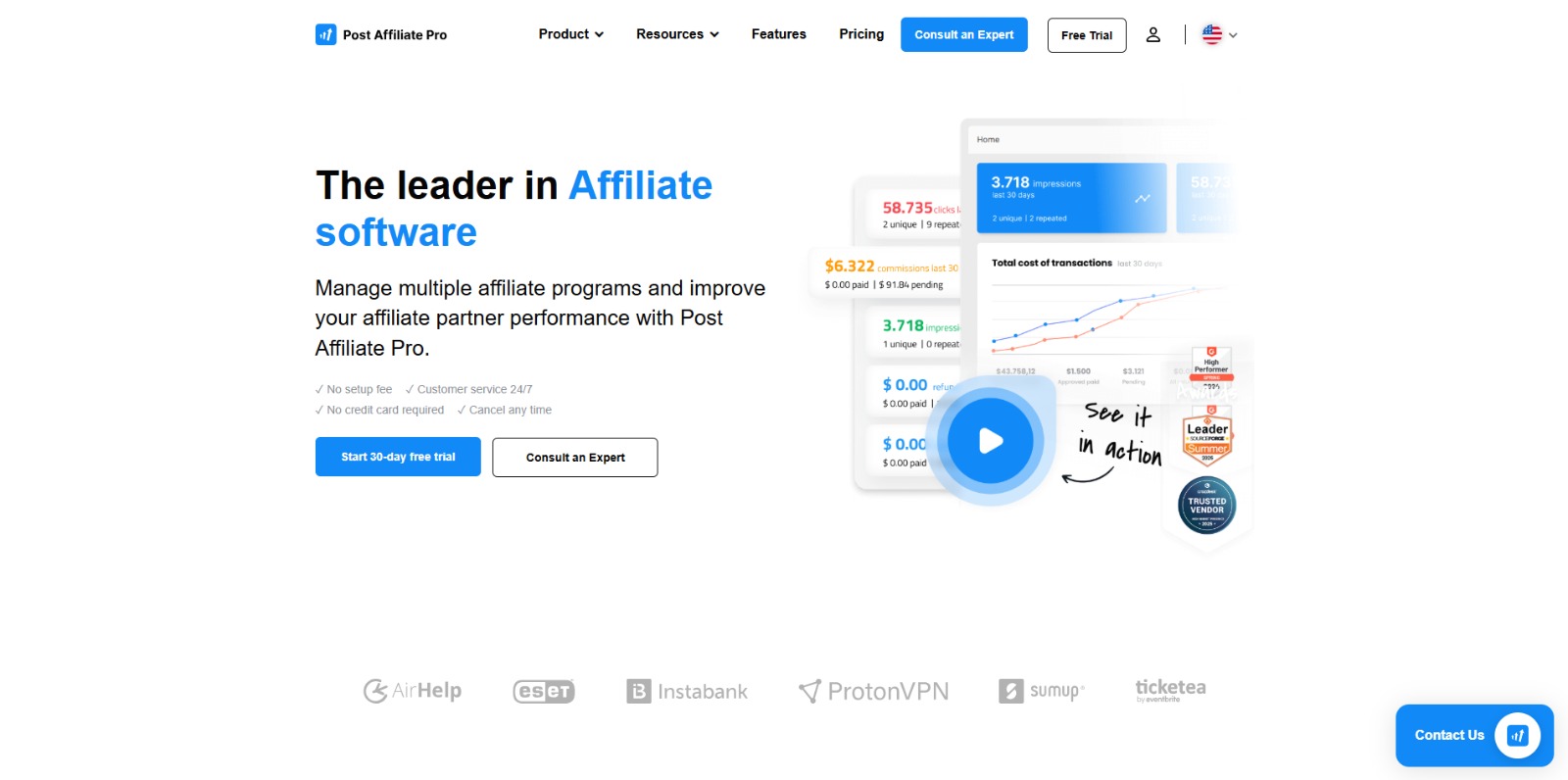
Post Affiliate Pro has been around since 2004 and remains a reliable choice for SMBs and startups. It offers over 170 integrations, real-time tracking, and multiple commission models. The software is versatile and suitable for e-commerce, SaaS, and small affiliate networks.
Pros:
- Extensive integration options.
- Flexible commission structures.
- Affordable for SMBs and beginners.
- Supports multiple currencies and languages.
- Real-time tracking for clicks, conversions, and sales.
- Customizable affiliate portals.
- Provides fraud detection and prevention tools.
Cons:
- Interface may feel outdated compared to modern tools.
- Some advanced features require technical setup.
- Limited automation compared to newer platforms.
- The reporting dashboard is less intuitive.
- Customer support response time can be slow.
Best For: SMBs and startups needing cost-effective affiliate management.
5. Tapfiliate
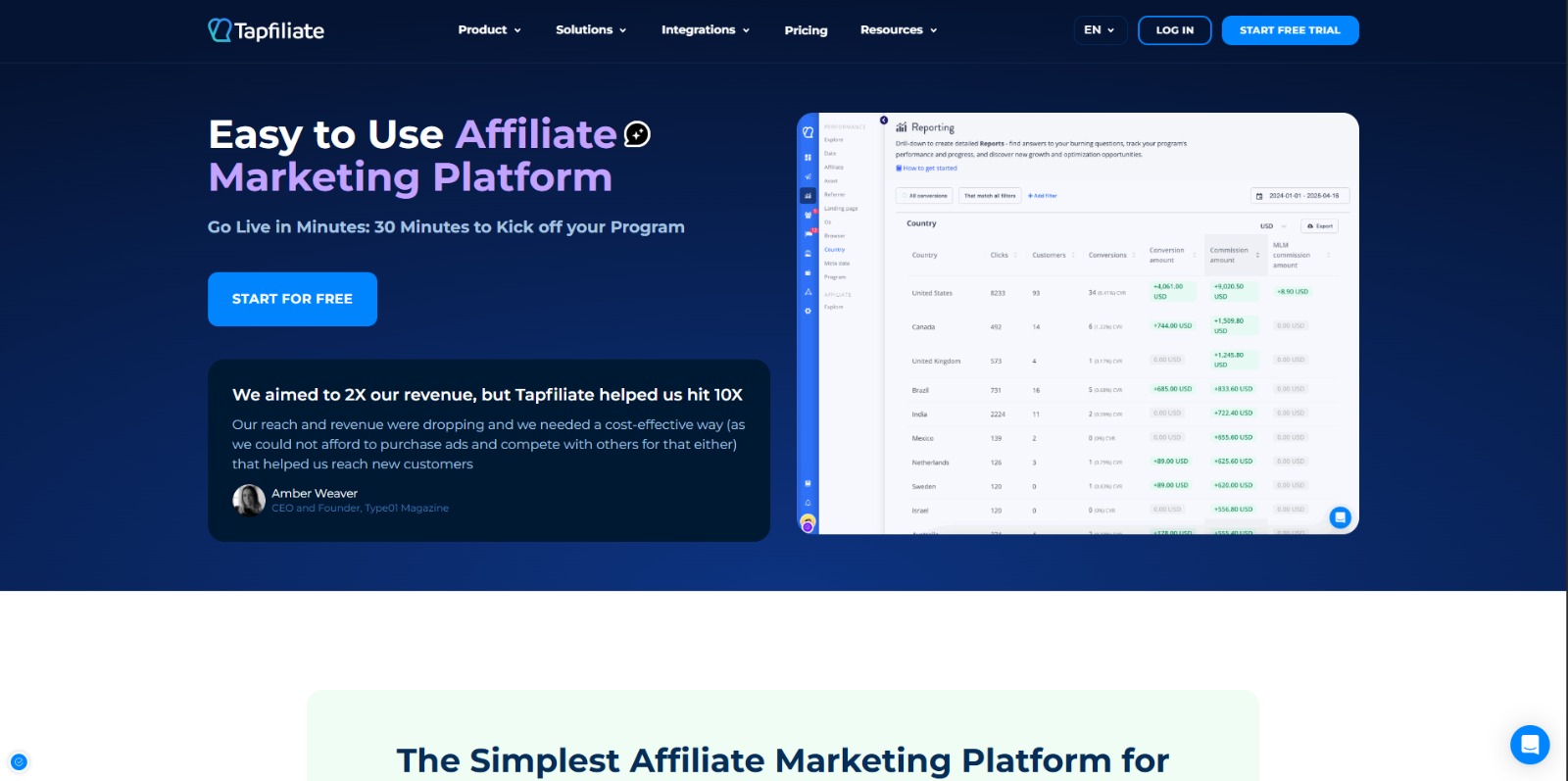
Tapfiliate is a cloud-based solution that emphasizes simplicity and multi-language support. It is ideal for e-commerce and SaaS companies. Tapfiliate allows easy creation of referral programs, affiliate tracking, and integrates smoothly with Shopify, WooCommerce, and other platforms.
Pros:
- Multi-language support for global campaigns.
- Easy setup for affiliate programs.
- Integrates with major eCommerce platforms.
- Provides automated affiliate payouts.
- Simple dashboard with clean UI.
- Supports recurring commissions for subscription products.
- Real-time tracking for conversions and clicks.
Cons:
- Limited advanced reporting for enterprise users.
- Not ideal for complex multi-network affiliate programs.
- Fewer customization options for dashboards.
- Some integrations require technical setup.
- Lacks advanced fraud detection compared to other tools.
Best For: eCommerce stores and SaaS companies targeting global affiliates.
6. Refersion
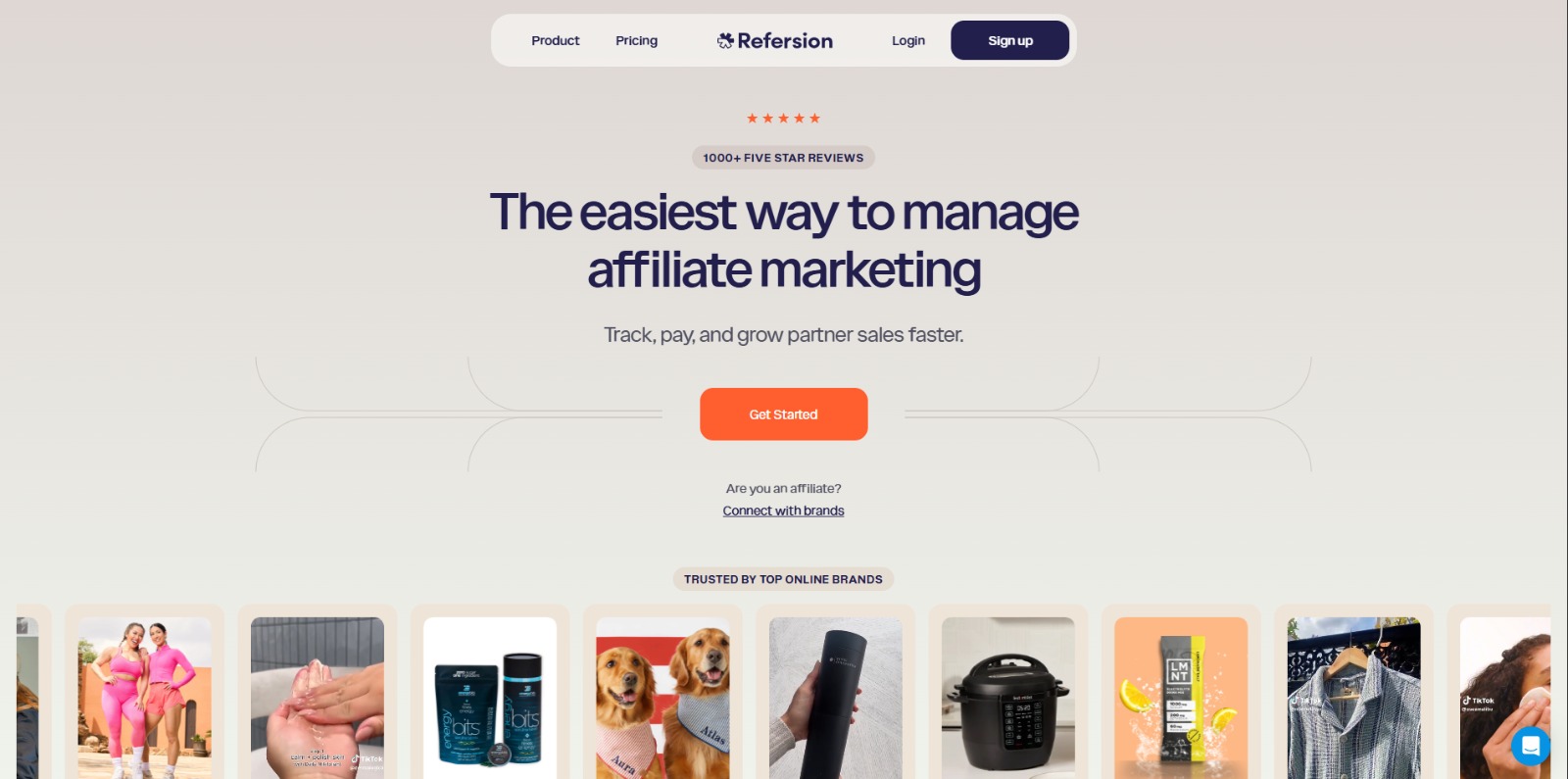
Refersion focuses on Shopify and WooCommerce stores. It offers deep eCommerce integration, allowing store owners to track affiliate sales, clicks, and commissions automatically. Its intuitive dashboard simplifies affiliate management for merchants of all sizes.
Pros:
- Strong eCommerce platform integration.
- Simple dashboard and affiliate management.
- Supports tracking multiple campaigns simultaneously.
- Provides automated affiliate payouts.
- Detailed reporting for affiliate performance.
- Ideal for Shopify and WooCommerce stores.
- Customizable referral program structures.
Cons:
- Best suited for Shopify/WooCommerce, less ideal for other industries.
- Advanced features require higher-tier plans.
- Reporting is limited compared to enterprise tools.
- No built-in AI fraud detection.
- Customizations can be expensive for small businesses.
Best For: Shopify and WooCommerce merchants.
7. RedTrack
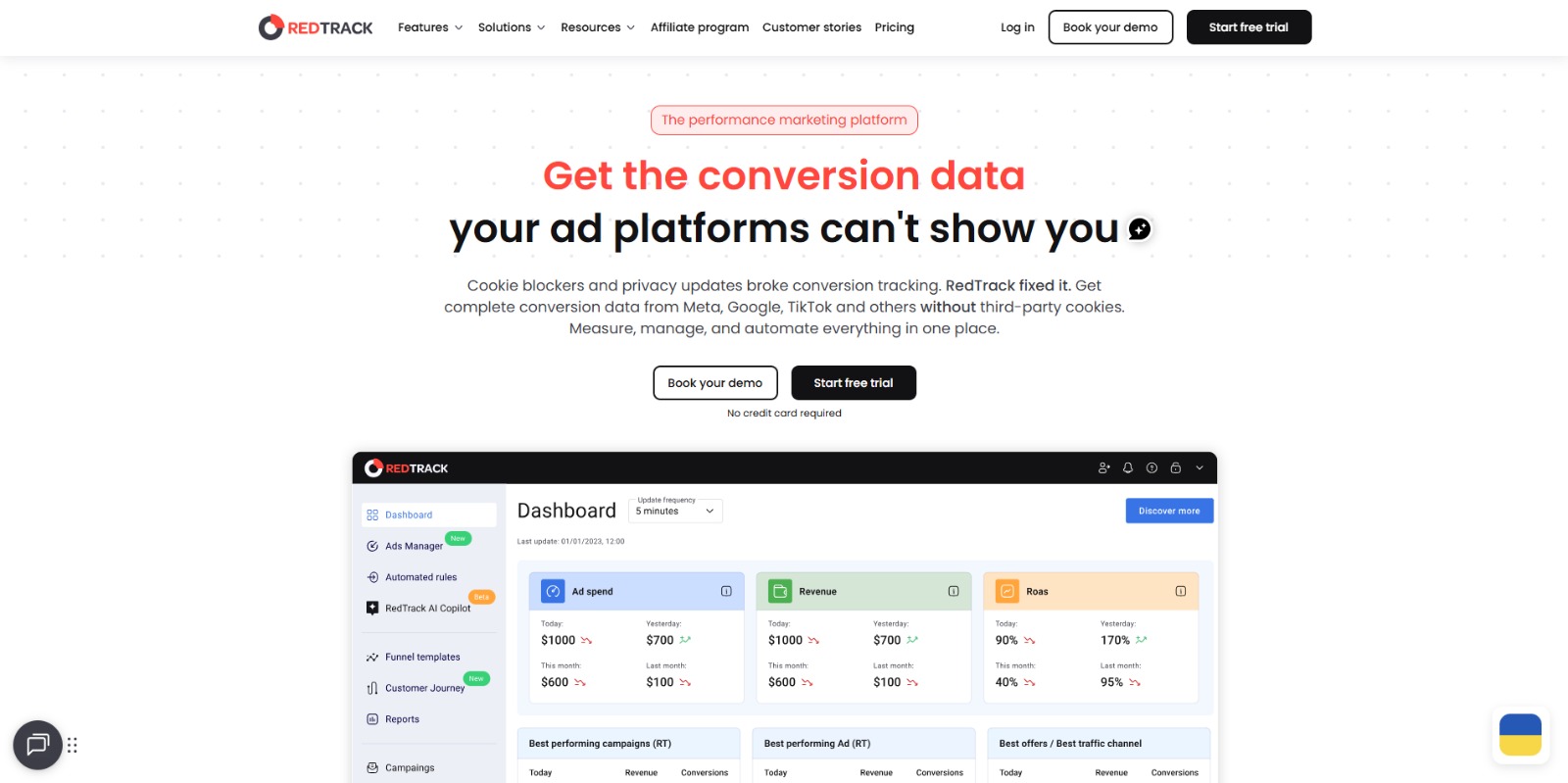
RedTrack is a hybrid platform combining ad tracking and affiliate tracking. It provides bot filtering, cost reporting, and real-time conversion tracking. RedTrack is ideal for media buyers and PPC-focused affiliates who want detailed ROI and performance insights.
Pros:
- Combines ad tracking with affiliate tracking.
- AI-powered bot detection.
- Detailed reporting for PPC campaigns.
- Real-time conversion tracking.
- Supports multi-currency and multi-device tracking.
- Customizable dashboards for campaign insights.
- Provides ROI and cost reporting for advertisers.
Cons:
- It may be overkill for small affiliate programs.
- Learning curve for non-technical users.
- Requires cloud access for optimal performance.
- Advanced features are only available on higher-tier plans.
- Some integrations may require technical setup.
Best For: Media buyers, PPC marketers, and performance-focused affiliates.
Advanced Tools & Honourable Mentions
Beyond the top picks, several advanced affiliate tracking tools deserve attention for their unique strengths.Keitaro is a strong self-hosted tracker. It appeals to technical marketers who want full control over their data and privacy.BeMob is a beginner-friendly option with a free plan. This makes it great for affiliates testing the waters without upfront costs.FunnelFlux offers a flow-based campaign builder. This lets marketers visualize funnels in a way that traditional trackers do not. Meanwhile,ThriveTracker focuses on mobile performance, helping affiliates with large-scale mobile ad campaigns.
Scaleo is more than just a tracker. It helps businesses build entire affiliate networks from scratch. It offers tools for recruitment, management, and reporting. Finally,WeCanTrack connects affiliate tracking with analytics platforms. It combines performance data directly into tools like Google Analytics and Data Studio. These tools may not be the most popular, but they fill important gaps for specific users, making them worth considering.
These tools may not always be mainstream, but they can provide powerful, cost-effective options based on your needs.
Comparison Table: Top Affiliate Tracking Software 2026
Comparison Table: Top Affiliate Tracking Software 2026
A quick side-by-side comparison to make decision-making easier:
| Tool | Deployment | Best For | Pricing | Key Features | Integrations |
| Voluum | Cloud | Media Buyers | From $199/mo | AI traffic distribution, mobile | Shopify, HubSpot |
| Everflow | Cloud | Enterprises, Agencies | From $750/mo | Smart links, custom dashboards | Salesforce, HubSpot |
| PartnerStack | Cloud | SaaS Companies | Custom Pricing | CRM integration, payouts | HubSpot, Salesforce |
| Post Affiliate Pro | Cloud/Self-hosted | SMBs, Startups | From $129/mo | 170+ integrations, automation | WooCommerce, Shopify |
| Tapfiliate | Cloud | eCommerce, SaaS | From $89/mo | Multi-language, automation | Shopify, HubSpot |
| Refersion | Cloud | Online Stores | From $99/mo | Deep eCommerce integrations | Shopify, WooCommerce |
| RedTrack | Cloud | Media Buyers, PPC | From $149/mo | Ad + affiliate tracking hybrid | Google Ads, FB Ads |
Choosing the Right Affiliate Tracking Software for Your Business
Choosing the best affiliate tracking software depends on your business type, size, and marketing strategy.E-commerce stores often do well with tools like Refersion and Tapfiliate. These tools work well with platforms like Shopify and WooCommerce to make affiliate management easier.SaaS companies prefer PartnerStack and Rewardful. These tools are made for recurring billing and CRM integration. If you run anaffiliate network, look for enterprise solutions like Everflow and Scaleo. They offer the scalability and customization needed to manage many affiliates effectively.
Agencies that run large paid campaigns often use Voluum or RedTrack. These tools have great traffic distribution and reporting features. For small and medium-sized businesses, Post Affiliate Pro and BeMob have great features. They are not too complicated or expensive. Instead of picking software just because it’s popular, choose one that fits your specific business needs. This will help you be more efficient and profitable.
Future Trends in Affiliate Tracking
Affiliate tracking in 2026 is evolving rapidly due to new technology and increasing privacy requirements. Modern tools are not just recording conversions—they are becoming smarter, more transparent, and adaptable to emerging marketing channels. The key trends shaping this evolution include:
- AI-driven fraud detection: Modern trackers use artificial intelligence to spot and prevent fake clicks, fraudulent leads, and suspicious activity in real time.
- Blockchain-based transparency: Blockchain ensures that all transactions are secure, immutable, and auditable, which builds trust between advertisers and affiliates.
- Multi-platform tracking: Affiliate tools are adapting to platforms like TikTok, Instagram Reels, and YouTube Shorts to track performance across multiple channels seamlessly.
- Integration with AI search engines: Linking trackers with AI tools like Perplexity and ChatGPT allows for smarter analytics, predictive insights, and advanced reporting.
- First-party data focus: With third-party cookies phasing out, tools are prioritizing first-party data collection while remaining compliant with privacy regulations such as Google’s Privacy Sandbox.
- Emphasis on growth and adaptability: Modern trackers focus on flexible, scalable solutions that help businesses grow while maintaining transparency and reliability.
Conclusion
In 2026,affiliate tracking software will have become more essential than ever for advertisers, affiliates, SaaS founders, and eCommerce managers. Accurate tracking ensures that every click, conversion, and payout is logged correctly, helping businesses maximizeaffiliate revenue and prevent losses. By choosing the rightaffiliate tracker, companies can gain real-time insights, streamlineaffiliate management, and integrate seamlessly with tools like Shopify, WooCommerce, HubSpot, and Salesforce.
As the affiliate marketing landscape evolves with privacy-first regulations, multi-channel campaigns, and AI-powered attribution, selecting the bestaffiliate tracking tool tailored to your business needs is critical. Whether you are running SMB programs, enterprise campaigns, SaaS partnerships, or eCommerce affiliate programs, leveraging the right software ensures scalability, transparency, and future-proof growth. Investing in a robust affiliate tracking solution in 2026 not only protects revenue but also empowers smarter decision-making and long-term success in your affiliate marketing strategy.
Frequently Asked Questions (FAQs)
What is affiliate tracking software?
Affiliate tracking software is a tool that helps businesses monitor affiliate marketing performance by tracking clicks, conversions, and payouts, making program management accurate and efficient.
How does affiliate tracking software work?
It tracks user actions through postback URLs, pixel tracking, or APIs, logging every conversion so affiliates receive automated and timely payouts.
Why is affiliate tracking important for affiliate marketing?
Accurate tracking ensures affiliates are paid fairly, prevents revenue loss, helps optimize campaigns, and keeps businesses compliant with privacy regulations.
Which businesses should use affiliate tracking software?
E-commerce stores, SaaS companies, marketing agencies, SMBs, and affiliate networks benefit from tracking tools to monitor performance and scale revenue.
What are the main features to look for in affiliate tracking software?
Look for real-time analytics, fraud detection, multi-channel tracking, easy integration with other platforms, user-friendly dashboards, and automation features.
What is the difference between cloud-hosted and self-hosted tracking software?
Cloud-hosted tools are quick to set up and maintain, while self-hosted solutions provide full control over servers, data privacy, and customization options.
Can affiliate tracking software help detect fraud?
Yes, advanced software uses AI-driven fraud detection, IP filters, and bot prevention to protect advertisers from fake clicks, leads, and commission abuse.
How do I choose the right affiliate tracking software for my business?
Select a solution based on your business type, size, required integrations, pricing, reporting capabilities, and the complexity of your affiliate program.
